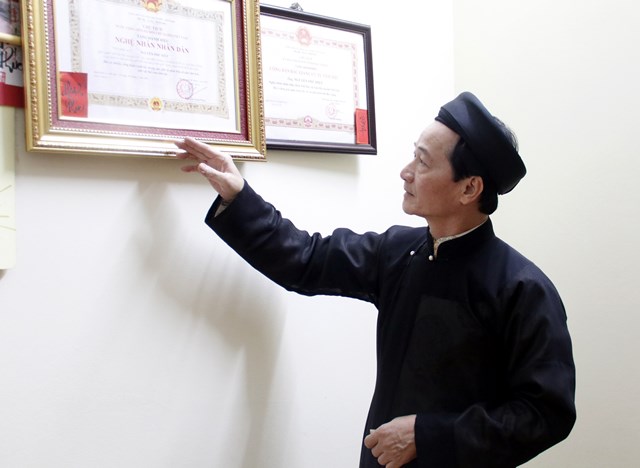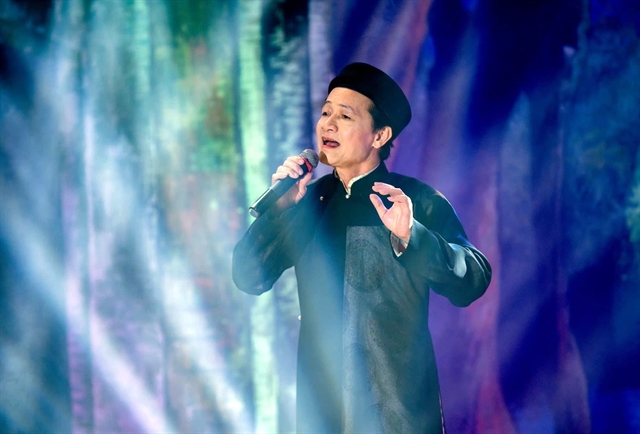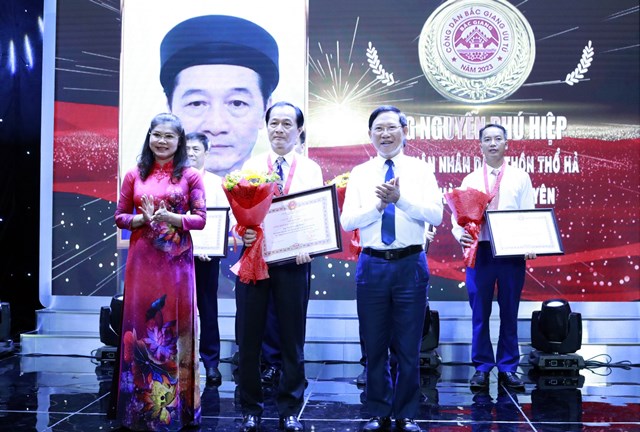Artisan Hiệp works to preserve quan họ singing
Culture - Ngày đăng : 15:24, 18/11/2024
 |
| With more than 35 years singing and preserving quan họ (love duet) People's Arrtisan Nguyễn Phú Hiệp has contributed remarkably to the development of the UNESCO Intangible Cultural Heritage of Việt Nam. VNA/VNS Photos |
BẮC GIANG — For his contribution to dân ca quan họ (love duet folk singing), listed by UNESCO as an example of intangible cultural heritage, People's Artisan Nguyễn Phú Hiệp has been honoured as one of this year's 25 outstanding figures nationwide in following President Hồ Chí Minh's ideology.
The ceremony, which was attended by Party General Secretary Tô Lâm, was held on November 15 in Hà Nội.
Beautiful voice
Artisan Hiệp's family lives in a house located deep in a small alley in Thổ Hà Village, Vân Hà Commune in Việt Yên Town.
Despite his age, at 60 years old, Hiệp still fascinates people with his deep, clear voice whenever he performs.
Born and raised on the north bank of the Cầu River, which has a long history of singing in quan họ style, Hiệp fell in love with this art form when he was a little boy.
"When I was young, I always went to the village communal house to watch ancient quan họ singing, which was held during the local spring festival," said Hiệp.
"The image of brothers and sisters in beautiful quan họ costumes enthusiastically going to festivals and singing love songs by the Cầu River fascinated me. The special melodies made me want to listen and learn it myself. Gradually, I memorised and could sing many songs."
When Hiệp joined the army, he was picked for his unit's music and dance troupe due to his unique voice and quan họ singing ability. Back in his hometown years later, he spent time researching and learning folk singing, taking classes with as many famous quan họ singers and trainers as he could.
“At that time, young people who were passionate and tried to learn quan họ like me were really rare. So when I asked to learn, the artisans initially refused.
"Then, with my sincerity and persistent persuasion, they agreed to teach me. The learning process was difficult because it was through oral tradition. They sang and I took notes and remembered as much as I could, then I went home and figured out how to do it right," Hiệp said.
 |
| People's Arrtisan Nguyễn Phú Hiệp seen singing quan họ in a music and dance performance. |
His effort brought good results. Hiệp participated in quan họ competitions and festivals of different levels and won top prizes, and his voice was well received by the public. He became a familiar quan họ singer at both domestic and international events.
Hiệp was famous for his ability to sing many difficult songs, such as Tuấn Khanh and Giăng Già (Old Moon).
The artisan became a representative for Việt Nam's Northern Cầu River Quan Họ Heritage zone, and was invited to perform at the 40th anniversary of the establishment of the UNESCO Centre in France.
His performance was highly praised by the audience, who said it helped promote Vietnamese culture around the world.
Over the course of his more than 35-year traditional singing career, Hiệp has collected more than 200 quan họ melodies with nearly 600 ancient lyrics.
He is considered an artisan with full knowledge of the ways and rules of singing quan họ.
The singer has mastered the technique of using lyrics to achieve resonance, modulation and strength, knows all about what goes into a quan họ singing routine, and is enthusiastic about teaching the folk singing art.
Hiệp leaves a strong impression on listeners, with his ancient singing style without musical accompaniment. Meanwhile, his singing technique with resonance, modulation and strength is a challenge for any singer to replicate.
He said quan họ culture contains a profound humanistic meaning. To be able to sing quan họ, people must understand the very sincere and delicate manners and communication style of quan họ practitioners. Quan họ was his passion and happiness, and he would only stop singing whenever his health prevented him.
Quan họ, a forever love
To spread the love of quan họ to the wider community, Hiệp tried to set up a singing club in 1987. However, his idea was rejected at first, because at that time not many people were interested in quan họ singing.
Instead of giving up, Hiệp sought help from the village's Elderly Association. After two years of persuasion, the Thổ Hà Quan Họ Club was officially established with 32 members.
As the head of the club, artisan Hiệp regularly runs classes on how to sing quan họ, and how people sang it in the past. To date, the club has attracted many learners of all ages.
On Saturday nights at the Thổ Hà Village communal house, practitioners gather to sing and teach each other difficult words in ancient quan họ.
These weekly gatherings help the club develop, with its singers winning many top prizes at contests.
 |
| People's Artisan Nguyễn Phú Hiệp (centre) receives the Outstanding Citizen of Bắc Giang title in 2022. |
Since 2017, the club has been a key part of the quan họ singing contest at the Thổ Hà Village Festival in early spring. The club's a capella singing style has become its brand, and the festival attracts thousands of locals and tourists annually.
Club member Nguyễn Đăng Nam said: "Among many modern cultural, artistic and entertainment activities, quan họ singing at the Thổ Hà Festival always attracts a lot of attention from audience members of all ages.
"This is a good and extremely valuable sign, confirming the community's love for Thổ Hà quan họ in particular and quan họ folk singing in general."
In addition to maintaining and developing the club, with his love for and influence on the singing style, artisan Hiệp has started many classes to teach quan họ to students and others in neighbouring areas.
Through the Bắc Giang Cultural Centre, since 2015 he has taught quan họ to more than 3,000 learners in 30 clubs in Hà Nội, Bắc Ninh and Bắc Giang.
At the same time, Hiệp has also worked as a lecturer at the Bắc Giang Province College of Culture, Sports and Tourism, and is a professional advisor and member of the jury in quan họ contests at the district and provincial levels.
The artisan also released a quan họ CD and a DVD titled Tôi Là Con Giai Sông Cầu (I Am a Son of the Cầu River), which includes 11 songs, and researched and compiled a book of ancient quan họ with over 400 songs.
Hiệp believes that all of his activities will help quan họ resonate with audiences so that it can last forever.
For his contributions to quan họ heritage, he was awarded the title of People's Artisan in 2022 and received the title of Outstanding Citizen of Bắc Giang a year later. VNS
